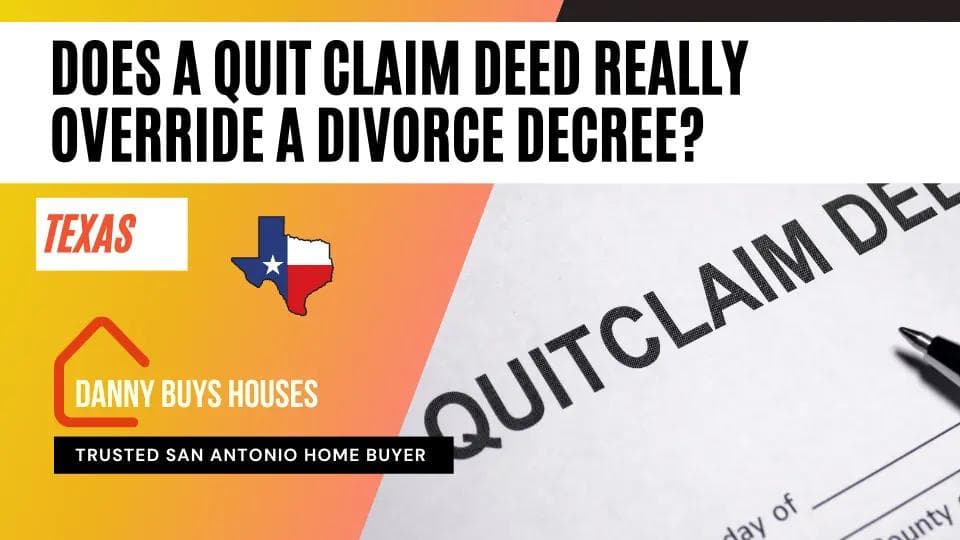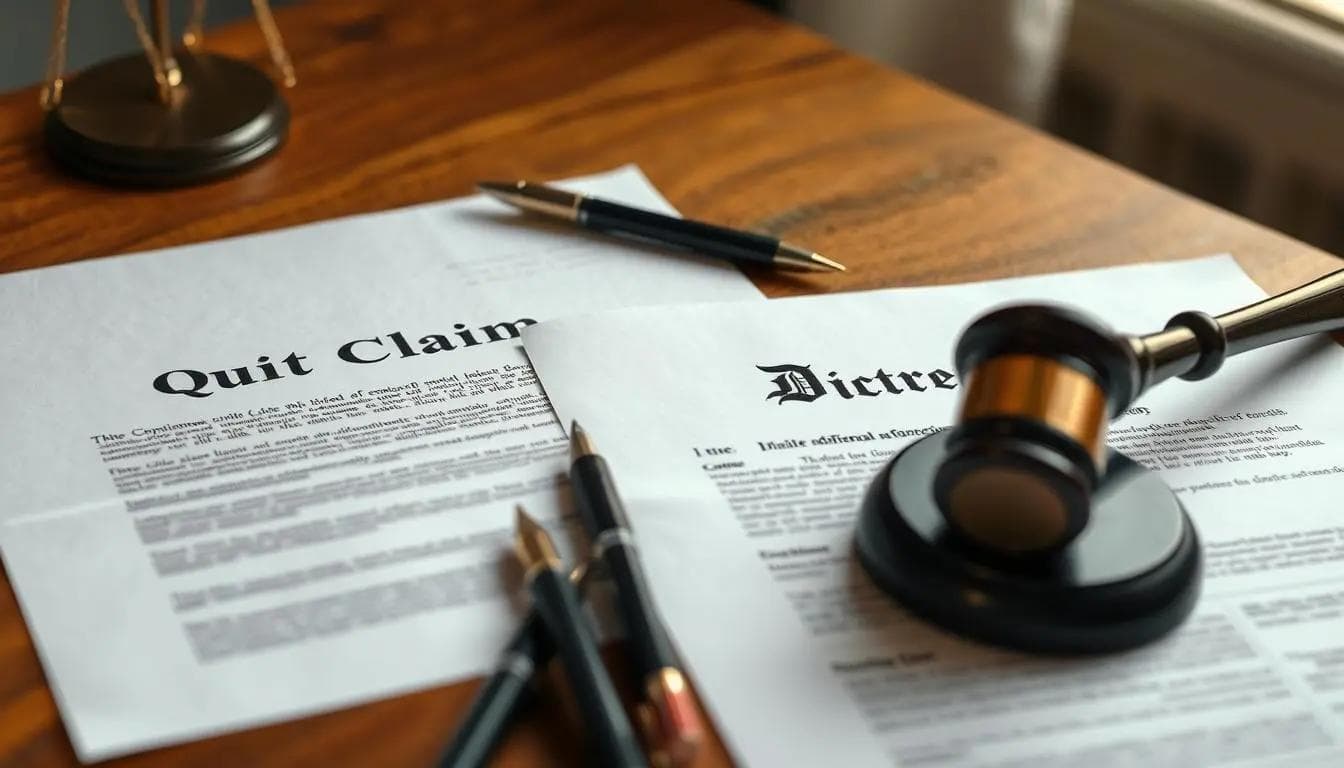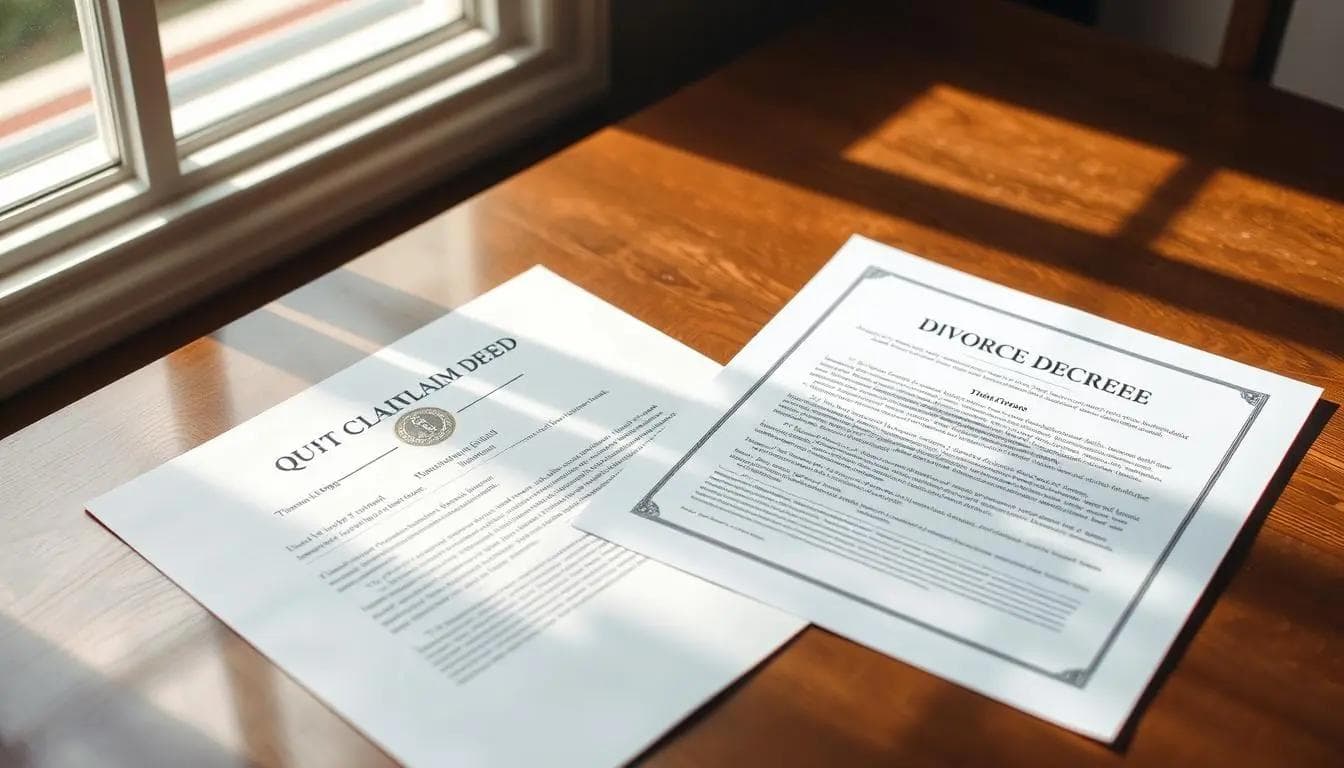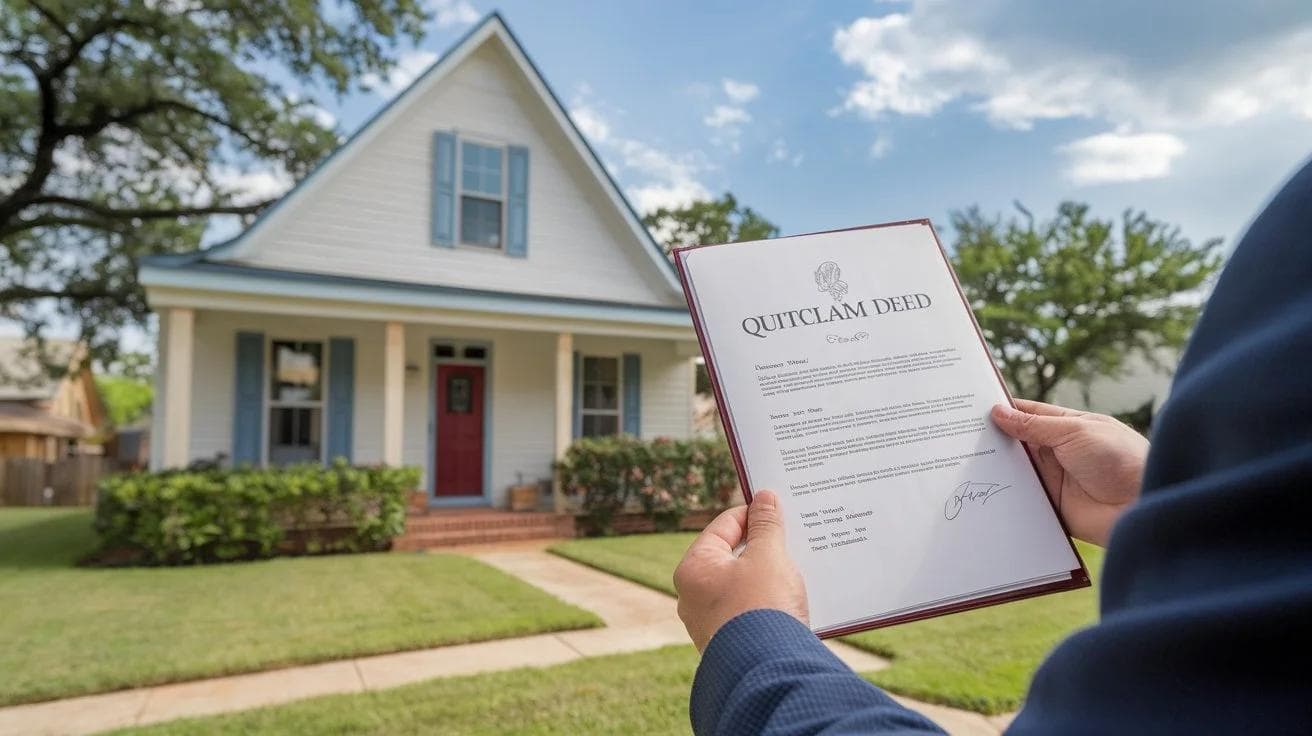
Does a Quit Claim Deed Really Override a Divorce Decree?
By Danny Johnson | Updated 10/9/2024, 8:40:13 PM
Learn if a quit claim deed can override a divorce decree, how to use it to transfer property, and best practices for removing an ex-spouse from the deed.
- Key Takeaways
- Does a Quit Claim Deed Override a Divorce Decree?
- Quit Claim Deed Use in Texas For Divorce Situations
- Understanding Quit Claim Deeds in Divorce Proceedings
- What is a Quit Claim Deed?
- The Role of Quit Claim Deeds in Property Division
- Timing: When to Sign a Quit Claim Deed During Divorce
- Protections Offered by a Quit Claim Deed
- Does a spouse have the right to property after signing a quit claim deed in Texas?
- Conclusion
🗂 Table of Contents
Divorce is a storm of emotions and paperwork. Who gets the home in divorce? How will ownership be given to one spouse? I've seen friends struggle with dividing property, their dreams of shared homes fading. I've also had to deal with it. It's not fun.
It's a painful process that makes people question how everything is going to be divided. With this comes questions about the legal details of quit claim deeds and divorce decrees.
We will cover the ins and outs of using a quit claim deed to grant interest in the property during divorce.
Quit claim deeds can be used to transfer the property ownership. These documents transfer ownership without ensuring the title's quality. But the big question is: Does a quit claim deed really take precedence over a divorce decree?

The short answer is no.
While quit claim deeds are strong for transferring property, they don't automatically win over a divorce decree. It's important to understand how these two legal tools work together in dividing real estate during a legal separation.
Let's dive deeper into quit claim deeds, divorce decrees, and property rights. We'll see how these elements interact (or sometimes conflict) in divorce cases. By the end, you'll know how to safeguard your property rights and ensure a fair split.
Key Takeaways
- Quit claim deeds transfer property ownership without title guarantees
- Divorce decrees outline property division terms
- Quit claim deeds don't automatically override divorce decrees
- Understanding both documents is crucial for fair property division
- Timing of quit claim deed signing affects property rights
- Legal advice is recommended for complex property transfers in divorce
If you are in a position where you are looking to sell your house right away so that you can quickly finalize your divorce and move on, you can do that too. We will show you at the end of this article how to get a cash offer to see what you can get for your house in an as is sale.
Does a Quit Claim Deed Override a Divorce Decree?

A quit claim deed doesn't change a divorce decree. The decree is a court order that divides property. (A court order could also order the sale of a house during divorce. Just FYI) The deed is a tool to carry out that division. Both work together in the divorce process.
In California, quit claim deeds are used in divorces to transfer property rights. They are often made by lawyers, title companies, or real estate experts. This is to avoid legal problems in the divorce settlement.
Signing a quit claim deed doesn't change mortgage obligations. Spouses must refinance the mortgage to remove one party from liability. If they don't, it can hurt both parties' credit if mortgage payments aren't made.
- Most divorces involve real estate
- The decree tells what to do but doesn't automatically divide property
- It's common for the receiving spouse to prepare a quit claim deed
- Incorrect handling of property transfer can lead to expensive legal issues
In Florida, quit claim deeds need two witnesses and must be notarized to be valid. Georgia law says real property can only be transferred by deed or specific language in the divorce decree.
Hiring an attorney well-versed in both family law and real estate law is advisable to handle property issues in divorce.
It's important to address all divorce matters during the process. This avoids future problems and costs with marital assets and property ownership. Working together during the divorce is easier than dealing with property issues later.
Quit Claim Deed Use in Texas For Divorce Situations
There is an article from a Texas attorney explains why quitclaim deeds can be dangerous when transferring property from one ex-spouse to another. Many articles on how to transfer property that are not specific to Texas law suggest using a quitclaim deed. It is important to note that this is not recommended in Texas.
Here is the article: https://www.danburkelaw.com/blog/why-quitclaim-deeds-arent-used-in-texas/
Understanding Quit Claim Deeds in Divorce Proceedings
Divorce often involves complex property transfer decisions. Quit claim deeds play a crucial role in this process, especially when dealing with a marital home or other real property.
What is a Quit Claim Deed?
A quit claim deed is a legal document used to transfer property ownership. It's commonly used in divorce cases to change joint ownership to sole ownership of real property. Unlike other deeds, it doesn't provide guarantees about the property's title.

The Role of Quit Claim Deeds in Property Division
During a divorce, quit claim deeds help implement the property division agreed upon in the divorce settlement agreement. They're particularly useful when one spouse keeps the marital home. The deed transfers the departing spouse's interest without affecting mortgage obligations.
Timing: When to Sign a Quit Claim Deed During Divorce
The timing of when you sign a quitclaim deed is crucial. It's typically done after the divorce is finalized and the property division is settled. Signing too early can impact financial obligations and property rights. Many couples work with title insurance companies to ensure proper execution.
- Quit claim deeds change ownership but don't affect mortgage responsibility
- They're usually prepared by attorneys or title companies
- The deed complements the divorce decree in property division
Understanding quit claim deeds is essential for smooth property transfers during divorce. They're a key tool in transforming joint ownership into sole ownership, aligning with the terms of your divorce settlement agreement.
Protections Offered by a Quit Claim Deed
Be careful though. Quit claim deeds offer the least amount of protection.
According to TexasLawHelp.org, "A quitclaim deed is simple to use but gives the grantee the least amount of protection. Texas courts have said a quitclaim deed, by definition, puts the grantee on notice that there may be other claims on the property – even if those claims are based on unrecorded deeds that are not on public record. In the past, this could make it impossible for the grantee, as well as any future buyer, to ever have clear title or claim protection as a good faith purchaser. Texas passed a law in 2021 to help fix this problem. Now, a grantee becomes a good faith purchaser four years after recording a quitclaim deed.'
Does a spouse have the right to property after signing a quit claim deed in Texas?
In Texas, owning property after a divorce can be tricky. The state's laws say that things bought during marriage belong to both partners. But, things change when a quit claim deed is signed.
Signing a quit claim deed usually means giving up your claim to the property. But, in Texas, it's not that straightforward. The deed only transfers the signing spouse's share. It doesn't change who owes the mortgage, unless the mortgage is refinanced.
Even after signing a quit claim deed, homestead rights might still apply. These rights protect your main home from being sold by creditors. It's important to think about when the deed was signed compared to the divorce.
Don't forget, a quit claim deed doesn't officially transfer property in Texas. For dividing property after a divorce, a Special Warranty Deed is often used. This deed costs around $30 to $40 to file with the county clerk.
- Community property is presumed for homes bought during marriage
- Quitclaim deeds don't affect mortgage obligations
- Homestead rights may still apply in some cases
- Special Warranty Deeds are preferred for post-divorce property transfer
If your ex-spouse won't sign the deed, you can use a certified copy of the divorce decree. This can help prove you own the property separately after the divorce.
Conclusion
Divorce can make dividing property very complicated, especially when it involves the home you shared. Quit claim deeds are important in this process. They help carry out the divorce agreement, but they can't change it.
It's key to know what happens when you sign a quit claim deed. It gives up your rights to the property but doesn't get you out of paying the mortgage. In places like Texas, California, and Florida, you need to think about special property rights.
After the deed is signed, you might need to refinance the mortgage. This step is to remove your ex from the mortgage. The divorce agreement might set a deadline for this and warn about what happens if you're late.
It's smart to make sure the divorce order talks about using the quit claim deed for refinancing. This way, you keep control over the property and the financial changes.
Real estate in divorce is full of tricky details. Getting legal advice is very important. A lawyer can help you understand your rights and options during and after the divorce. This advice can help avoid problems and make the change in property ownership smoother.
You can also sell the house during divorce for cash.
If you would like to see what you could get for the house rather than trying to deal with transferring ownership to a spouse or yourself, consider getting a cash offer. House buying companies like Danny Buys Houses in San Antonio, TX, buy houses as is and close quickly. This way you do not have to let your neighbors know you're selling or deal with other issues of putting your house on the market. Give us a call and we will make you a no-obligation cash offer at no cost to you.

AUTHOR
Danny Johnson
Owner and Founder at Danny Buys Houses
Danny Johnson is an experienced real estate investor who has been buying houses for cash since 2003. As owner of Danny Buys Houses, Danny's goal is to help homeowners sell their house fast, regardless of the situation, so they can move on with their life.
Danny has been featured in publications such as Forbes, Realtor.com, BiggerPockets, Yahoo Finance, US News, and more. He is also the author of the book 'Flipping Houses Exposed'.




